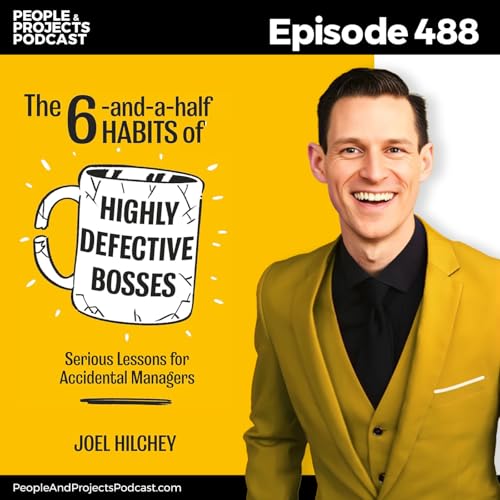Summary In this episode, Andy talks with Martin Dubin, psychologist, former CEO, executive coach, and author of Blindspotting: How to See What's Holding You Back as a Leader. Marty brings a rare combination of clinical insight and real-world leadership experience to a topic that affects every project manager and frontline leader: the blindspots that quietly shape our behavior, decisions, and impact. Together, the discussion explores how motives often drive our actions without us realizing it, why strengths can become liabilities when overused, and how emotion acts as one of the most powerful and least discussed forces in leadership. Marty explains his layered model of blindspots, including identity, motive, traits, emotion, and behavior, and shows how leaders can build awareness without trying to "fix" who they are. You will also hear practical guidance on creating a simple change plan that actually sticks, using small behavioral tweaks, prompts, and accountability rather than dramatic personal transformation. The conversation closes with thoughtful examples of how blindspotting can improve not only leadership at work, but relationships at home as well. If you want practical insight into leading with greater self-awareness, emotional range, and intentional growth, this episode is for you! Sound Bites "The hardest part of leadership is not managing others. It's managing ourselves.""Your strengths work for you most of the time, which is why it's so hard to see when they start working against you.""You know, whatever it is, it's usually invisible to us until someone or something forces it into view.""Now, if you put the modifier TOO in front of it, what happens when you're TOO confident? What happens when you're TOO organized? What happens when you're TOO creative?""What do they tell you? You are too....""Motives constrict under stress, and that's often when blindspots do the most damage.""Traits don't need to be changed. They need to be regulated.""Emotion is one of the most powerful tools leaders have, whether they use it intentionally or not.""Real change comes from small behavioral tweaks, not personality transformation." Chapters 00:00 Introduction01:42 Start of Interview02:00 Marty's Background and Family Influence05:38 What Drives Marty Crazy About Leadership Books08:20 Identity Blindspots and Leadership Roles11:00 Why Motive Is So Hard to See13:00 Using Emotion to Reveal Motives14:00 When Strengths Become Weaknesses17:50 Practical Ways to Spot Trait Blindspots19:00 Emotional Awareness and Leadership Influence21:10 Regulating Emotion Versus Repressing It22:50 Building a Change Plan That Works26:20 A Client Story That Shows Blindspotting in Action28:20 Applying Blindspotting to Parenting (and Grandparenting)30:14 End of Interview30:45 Andy Comments After the Interview35:42 Outtakes Learn More You can learn more about Marty and his work at MartinDubin.com. For more learning on this topic, check out: Episode 473 with Jeffrey Hull and Margaret Moore, who share rigorously researched insights on what it takes to lead.Episode 450 with Mark Miller, an engaging and empowering discussion about why leaders fail and how they grow.Episode 32 with Brad Kolar and Madeleine Van Hecke, exploring how the way our brains are wired influences how we lead. Level Up Your AI Skills Join other listeners from around the world who are taking our AI Made Simple course to prepare for an AI-infused future. Just go to ai.PeopleAndProjectsPodcast.com. Thanks! Pass the PMP Exam This Year If you or someone you know is thinking about getting PMP certified, we've put together a helpful guide called The 5 Best Resources to Help You Pass the PMP Exam on Your First Try. We've helped thousands of people earn their certification, and we'd love to help you too. It's totally free, and it's a great way to get a head start. Just go to 5BestResources.PeopleAndProjectsPodcast.com to grab your copy. I'd love to help you get your PMP this year! Join Us for LEAD52 I know you want to be a more confident leader, that's why you listen to this podcast. LEAD52 is a global community of people like you who are committed to transforming their ability to lead and deliver. It's 52 weeks of leadership learning, delivered right to your inbox, taking less than 5 minutes a week. And it's all for free. Learn more and sign up at GetLEAD52.com. Thanks! Thank you for joining me for this episode of The People and Projects Podcast! Talent Triangle: Power Skills Topics: Leadership, Self-Awareness, Emotional Intelligence, Motivation, Personality Traits, Behavior Change, Executive Coaching, Identity, Influence, Team Leadership, Blind Spots The following music was used for this episode: Music: Imagefilm 034 by Sascha Ende License (CC BY 4.0): https://filmmusic.io/standard-license Music: Fashion Corporate by Frank Schroeter License (CC BY 4.0): https://filmmusic.io/standard-license
続きを読む
一部表示
 2026/01/1345 分
2026/01/1345 分 48 分
48 分 2026/01/0739 分
2026/01/0739 分 56 分
56 分 43 分
43 分 2025/12/0542 分
2025/12/0542 分 52 分
52 分 51 分
51 分
